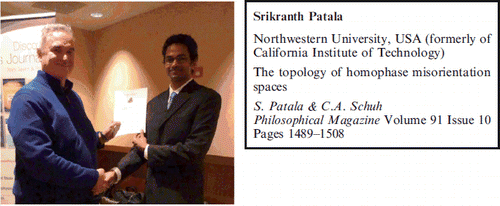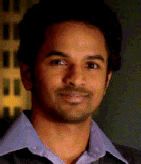We are pleased to announce the winner of the $1000 James Clerk Maxwell Young Writers Prize for 2011. The prize is awarded to Dr Srikanth Patala of Northwestern University, USA, for his paper ‘The topology of homophase misorientation spaces’ http://www.tandfonline.com/doi/abs/10.1080/14786435.2010.541169.
The 35 entries for the 2011 prize were received from 17 countries around the globe. The calibre of the entries reflected the high quality and cutting-edge science of papers published in Philosophical Magazine and Philosophical Magazine Letters and the diversity of nominees emphasised the global reach of both journals.
The excellent standard of papers impressed the Editors. We thank the nominators and congratulate all authors on their valuable contributions to the Journals.
Winner of the James Clerk Maxwell Young Writers Prize 2011:

Photo: Dr Patala receiving his certificate and 1000 prize from Professor Peter Riseborough at Taylor & Francis' reception during the American Physical Society March Meeting 2012.
Dr Patala, on receiving the award, said: ‘It is a great honour to be recognised by the Editors of Philosophical Magazine and Philosophical Magazine Letters for this prestigious award. There is nothing more gratifying for me than being rewarded for all the hard work and this award definitely provides me with the extra motivation to pursue high quality research at the intersection of mathematics and materials science.’
Please listen to the audio clip or read the transcript of Dr Patala's full response on The James Clerk Maxwell Young Writers Prize webpage: www.tandf.co.uk/journals/authors/tphm-tphl-prize.asp

Dr Patala obtained his Bachelors of Technology from the Indian Institute of Technology Madras in Metallurgical and Materials Engineering in 2005. He started his graduate education at Massachusetts Institute of Technology, receiving his M.S. in 2008 and Ph.D. in 2011, both in the Department of Materials Science and Engineering. He is currently a postdoctoral fellow at Northwestern University working in collaboration with Professors Monica Olvera de la Cruz and Laurence D. Marks. He is working on understanding the role of stress relaxation mechanisms in the growth of noble metal nanoparticles. He is particularly interested in developing growth models that can predict the structural aspects of metallic and alloy nanoparticles (NPs) under a variety of solvent and external conditions such as temperature, chemical environment, and composition. Dr Patala's ultimate goal is to understand the fundamental aspects of microstructures at various length scales and eventually develop algorithms to predict processing pathways for designing novel microstructures.
Dr Denis Anders was the runner-up whose paper was awarded the distinction of being Highly Commended:

Dr Denis Anders completed his degree in Computational Science and Engineering at the Department of Mathematics at the University of Siegen. He then went on to join the Chair of Solid Mechanics at the university where his Ph.D. studies focused on computations as well as experimental investigations of diffusion-induced microstructural changes in multicomponent functional materials, such as solders, polymer blends and reactive solutions. Abreast of the latest technological trends, Dr Anders is particularly interested in the study of microstructures in functional materials and the challenges posed by the ongoing miniaturization of microelectronic components as well as environmental considerations that demand a deep understanding of the effect of microstructural evolution on mesoscopic material properties.
Dr Anders’ highly commended paper, ‘Application of operator-scaling anisotropic random fields to binary mixtures’, is based on a joint-project with Dr Alexander Hoffmann and Prof. Hans-Peter Scheffler from the Chair of Probability Theory and Analysis from the University of Siegen. In their studies they uncovered that phenomena such as random physical imperfections within the material and random noises in the exterior thermodynamic fields influence, in essence, the microstructural evolution in functional materials. Therefore smart models for random phenomena coupled to diffusion mechanisms on the micro level have to be implemented in order to gain a novel insight into microstructural formation and a realistic mapping of physical phenomena in numerical simulations.
The Publishers are delighted to provide free access to both papers until the end of July 2013 via the James Clerk Maxwell Young Writers Prize website: www.tandf.co.uk/journals/authors/tphm-tphl-prize.asp
The Editors of Philosophical Magazine and Philosophical Magazine Letters are keen to support young emerging authors in all its scientific areas of interest so, if you are a young writer who has authored or co-authored a paper in Philosophical Magazine or Philosophical Magazine Letters during 2012, or intend to do so, you could be in the running for next year's prize. To be eligible you should be a Ph.D. student at the time of writing the paper or have completed your Ph.D. within the two previous years. You will also need to be nominated by your supervisor or senior author of the paper. The nomination form and terms and conditions can be found at www.tandf.co.uk/journals/authors/tphm-prize.doc
We look forward to receiving entries for the 2012 prize, the closing date for which is 31 December 2012.